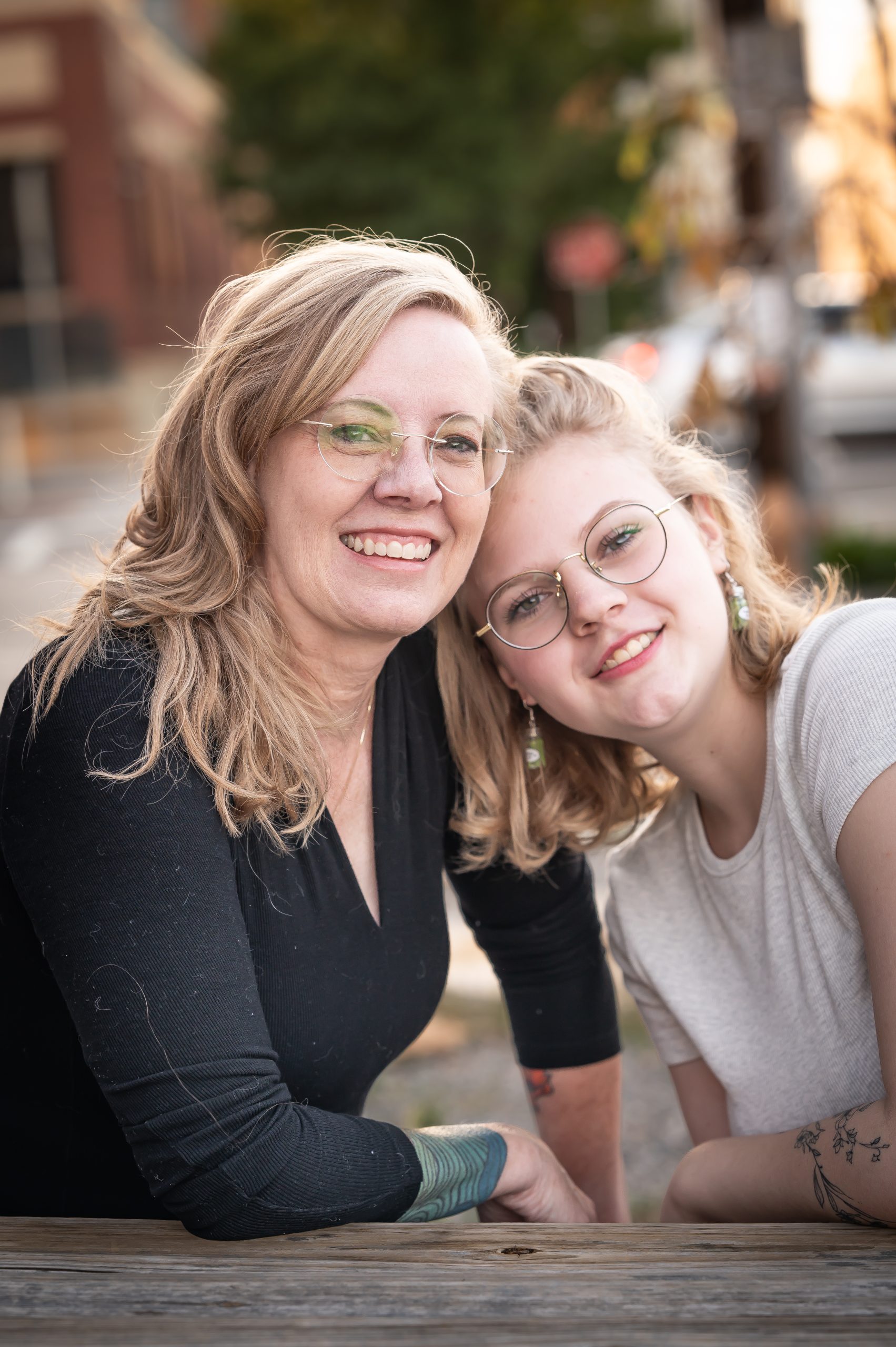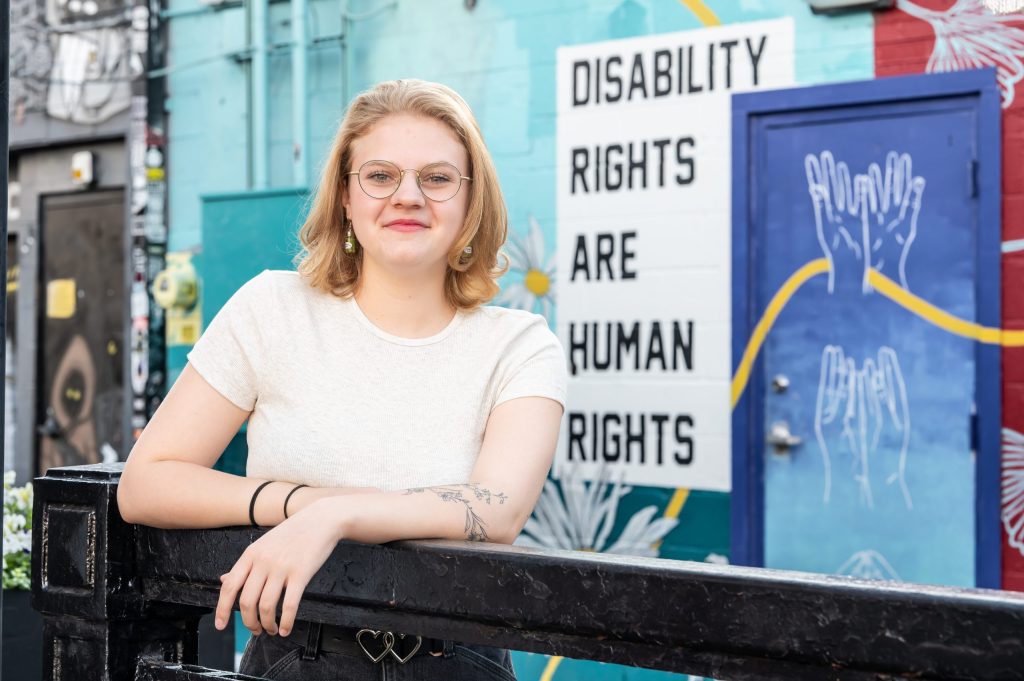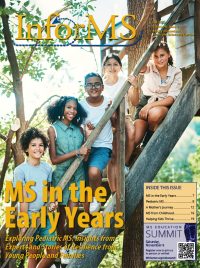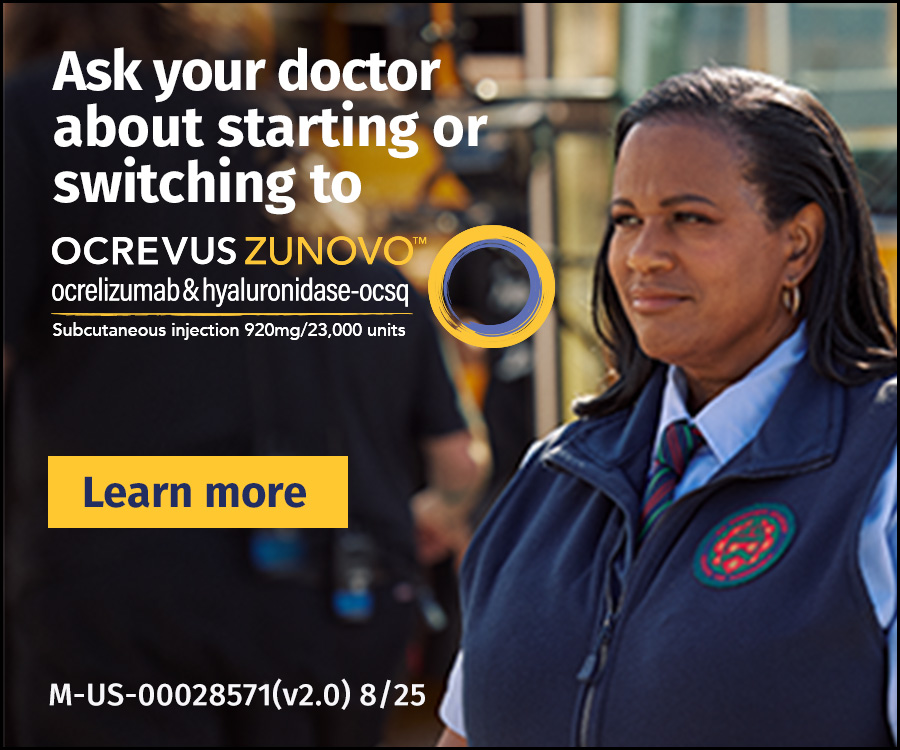
When Abby Jones was diagnosed with multiple sclerosis at just 14 years old, it marked the beginning of a life-changing journey for her and her family. We spoke with her mother, Brooke Jones, about the early signs, the road to diagnosis, and how their family navigated the emotional and practical impact of living with pediatric MS.
InforMS: Let’s start from the beginning. What were some of the early signs or symptoms that Abby experienced?
Brooke: We first started noticing symptoms when Abby was about 10 years old. She was experiencing numbness in her legs, which happened several times over the course of a few months. We went to the emergency room multiple times, but at that point, no one diagnosed her. Doctors told us it could be stress or maybe overexertion from gym class—things like that.
It wasn’t until she was 14 that things really escalated. One day, after a sleepover at a friend’s house, she told me she had a headache and that her eye felt “weird.” That was totally out of character for her. She never complained about pain—ever. Initially, I thought maybe we could wait until Monday to see an eye doctor. But by the time we got home, I could tell she was in real discomfort. We took her to Children’s Hospital.
We were there for about 12 hours before the on-call ophthalmologist saw us. He was incredibly kind and thorough. After examining her eye, he said he suspected optic neuritis and recommended an MRI. At first, I was surprised—it just seemed like a headache. I remember asking, “Do you know what’s really going on here?” He said he couldn’t make a diagnosis, but added, “If this were my child, I’d admit her tonight.” So, we did.
“You never think something like MS will happen to your child. But once it does, you learn how strong your family really is.”— Brooke
InforMS: Once she was admitted, how quickly did the diagnosis come?
Brooke: Pretty quickly, they confirmed the optic neuritis. Then came the question—was this MS or something else? Her MRI showed 14 lesions in her brain. There were other possibilities, but MS was the leading theory. They started her on high-dose IV steroids to try and restore vision in her right eye, which had gotten quite bad by then.
It was right after everything had shut down for COVID. Only her dad and I were allowed in the hospital with her, so we felt very isolated. Emotionally, I was terrified but also in denial. I kept thinking, “She’s 14—it can’t be anything serious.” Abby herself was mostly focused on going home; she didn’t fully understand what was happening yet.
InforMS: What was it like when you received the official diagnosis?
Brooke: I’ll never forget that moment. There must have been eight or nine people in the room—residents, students, and Dr. Schreiner. She explained everything very clearly, even while using medical terms, and she asked the residents for their input. Every one of them agreed: it was MS. I was hoping someone would say, “No, I think that’s wrong, she’s fine, or it’s something else.” But no one did.
At first, Abby didn’t say much—she just wanted to know when we could go home. But after everyone left the room, she started crying. I sat with her on the bed and asked what was going on. She said, “I don’t want them to cut into my skull.” There had been so much talk about brain lesions, she thought they were going to go in and remove them. I had to reassure her that wasn’t the case.
InforMS: That’s heartbreaking. Were there any other difficult moments during that time?
Brooke: Definitely. She had to get a spinal tap, which was rough. The procedure itself was hard, but the real challenge was the pain and discomfort she had for several days afterward. We didn’t know to expect that.
I also had to start calling family and friends to share the news. Everyone wanted to know: What’s next? What does this mean for her future? And I didn’t have answers. Like many people, my perception of MS was shaped by worst-case scenarios—wheelchairs, disability, even death from complications. I couldn’t wrap my head around the idea that my 14-year-old child’s life could be so drastically and suddenly changed—or even shortened.
I remember calling my now-husband from the hospital. He asked, “What can I do? How can I help?” And I said, “I need you to find information that gives me hope.” The image I had in my head of MS… it was bleak. I needed that perception to change.
So he started sending me articles, research studies—anything that might suggest a brighter outlook.
InforMS: How did you begin to navigate treatment options?
Brooke: We started talking about medications early on. I remember Dr. Schreiner coming into Abby’s hospital room and writing the names of several potential treatments on the whiteboard. After she left, Abby’s dad and I looked at each other—“What was the one that started with T? Or the one with O?” We dove into research. We read everything we could find about each option, trying to understand what might be best for her.
Eventually, we made a decision together on which treatment path to take. It felt like such a massive responsibility—trying to make the right call for your child’s future when you’re still learning what this disease even means.
InforMS: What was that time like emotionally?
Brooke: A lot of it was spent trying to reassure Abby. I wanted her to know that no matter how this disease showed up for her, she would be okay. That there had been so many advancements in research, in treatment, in medicine… that her future could still be bright.
But I was talking to a 14-year-old with zero context for what MS even was. For the first couple of years, she really didn’t want to know much about it. She’d say, “Just tell me where I need to go, when I need my infusion, and what I’ll feel like after. That’s all I want to know.” She’s gotten past that phase now. But in the beginning, it was all about getting through the moment with as little disruption as possible. I think it’s really common.
InforMS: Absolutely. What resources or strategies were most helpful for you and your family in those early days?
Brooke: For me personally, having access to Dr. Schreiner and her team was everything. I look back now and realize—I must have messaged her multiple times a day at one point. I had so many questions: “What about this? What about that?” It was constant.
When you’re learning about MS for the first time, it’s incredibly scary. You hear terms like JC virus, or ask if there’s a connection to other conditions like ADEM or NMOSD. And you wonder—do these all go hand-in-hand?
Dr. Schreiner and her team were so patient. They answered every question, never made me feel like I was asking too much. That level of support was a lifeline.
And the Rocky Mountain MS Center was huge for us. I spent so much time on the website just learning—absorbing as much as I could. And we attended several Zoom calls, especially since this was during the height of COVID. We couldn’t meet anyone in person, but those virtual connections became a lifeline.
It was also incredibly helpful for Abby to see other pediatric MS patients—to know she wasn’t alone. These other kids… they weren’t suffering. I don’t mean they were unaffected, but they were living. They were going to school. They were still doing life. That visual—seeing her peers moving forward despite their diagnosis—was powerful.
InforMS: How did Abby handle her diagnosis socially, especially as she moved through school?
Brooke: At first, she didn’t want anyone to know. She didn’t want any special treatment either. But as time went on, especially during high school, we realized we had to rely heavily on the school system for accommodations. That was not easy—it was a battle all four years.
The hardest part was helping people understand that her biggest challenges—fatigue and nerve pain—are invisible. To others, she looked fine. She was a teenager, so if she came in late, people assumed she just overslept. But she was dealing with relentless fatigue and pain. It took constant communication to explain that this wasn’t about laziness or avoidance. She’s a National Honor Society student—she wasn’t slacking off. She was fighting her way through.
“We had to become advocates right away — for Abby at school, at the doctor’s office, and in everyday life.”— Brooke
InforMS: That must’ve taken a tremendous amount of advocacy. Did you have help educating the school?
Brooke: Yes. I leaned on Children’s Hospital to help educate the school about what MS looks like, especially in a young person. That external support really helped validate what we were saying.
InforMS: That’s so important. For other families facing similar school-related challenges, what advice would you give? What worked in terms of advocacy and accommodations?
Brooke: First and foremost—start early. As soon as your child is diagnosed, begin working with the school. Get a 504 Plan or an IEP in place, even if you’re still figuring out exactly what accommodations are needed.
Abby had a 504 Plan, which is typically used for conditions like ADHD. But honestly, I think these plans are often overlooked in schools these days. There was a point where teachers didn’t even have access to her 504 for over a year—so it wasn’t being followed.
My advice? Be present. Be persistent. Make sure the school staff knows you, knows your child, and understands exactly how MS is impacting them.
InforMS: What kinds of accommodations were most helpful for Abby?
Brooke: She missed a lot of school due to doctor’s appointments, infusions, and flare-ups, so she was given extra time for assignments. They also agreed that if it was busywork—like worksheets—she didn’t have to do it. She could if she wanted, but it wasn’t required. The focus was on meaningful assessments like projects and tests.
They also adjusted her schedule. She didn’t have early morning classes, which made a big difference. She did a sort of volunteer or work-study program that allowed her to sleep in more and preserve her energy.
Beyond that, we worked closely with school administration, counselors, and the nurse. You really have to be visible—engaged. And again, educating them constantly on how MS actually manifests in your child is key.
InforMS: You mentioned earlier how helpful it was for Abby to connect with other young people living with MS—to see that she wasn’t alone and that kids are thriving. Can you share more about how that impacted her and, more broadly, how living with MS has shaped her social life?
Brooke: Absolutely. In the beginning, she didn’t even want to acknowledge that she had MS. She didn’t tell her friends, and she really didn’t want to talk about it. I remember one clinic visit at Children’s, Dr. Schreiner mentioned this program called Oscar the Monkey. And I have to admit, both Abby and I were skeptical. It sounded like something for little kids.
But I said to her, “Let’s just join one of the Zoom calls—just one.” She agreed but kept her camera off the whole time. Still, it made an impression. She saw other kids from all over the world, kids who looked like her and were living with MS. And I think that was a turning point. She realized that while pediatric MS is rare, it’s not so rare that she’s truly alone.
She later attended the Oscar the Monkey summer camp, and it was life-changing. She met kids who are still some of her best friends today. She finally had a peer group who got it. They understood her without needing explanations.
We also went to an event in Denver—kind of a reunion or activity day where they re-created some of the camp experiences. There was one activity where we had to wear goggles smeared with Vaseline to simulate visual impairments. I remember thinking, “Okay, this is silly,” but then Abby turned to me and said, “That’s how my right eye sees. All the time.” That moment hit hard. It gave us, as her parents, a tiny glimpse into her daily reality.
She’s stayed in touch with many of those kids. Some have progressed in their disease—one of her close friends now uses a cane. That was hard for Abby to see. She asked me, “Is that going to be me?” And I told her the truth: it might be next year, it might be 30 years from now, or it might never be. We don’t know. But we face it together.
InforMS: That kind of community sounds like it’s been a pillar of strength for her. How has MS affected your family dynamics and relationships overall?

Abby navigated MS through high school and into college, and is currently studying to become a nurse.
Brooke: In many ways, it’s reshaped everything. Socially, Abby has grown into someone who is now very open about her MS. She advocates for herself in ways that continue to inspire me. When she went off to college, she wanted to do everything—parties, hikes, travel, all of it. But pretty quickly, she realized she just couldn’t keep up.
And instead of isolating herself, she was honest with her friends. She told them, “I can’t do that today,” and her friends adapted. Instead of long hikes, they’d go for a walk in the park. She’s built a community around her—people who understand and support her limits without judgment. That’s been everything.
As for our family, it’s been a journey. She ended up moving back home after that first year of college. The pace, the physical strain—it was just too much. She’s now in community college and working part-time, and she’s genuinely happy. But, as any parent might imagine, there are still challenges.
For example, she sleeps a lot. And I get it—fatigue is one of the most debilitating symptoms of MS. But as a parent, it’s hard not to wonder, is this the disease, or is this just being a 20-year-old staying up too late watching TikToks? We’ve had some honest conversations about it. I’ve told her, “If you want your body to take care of you, you’ve got to take care of your body.” That means eating well, getting enough sleep, staying hydrated. That balance between empathy and accountability is tough to navigate. It really is. But we try. And I think that open dialogue has helped her mature a lot. She knows we’re not judging—just trying to support her the best we can.
InforMS: You’ve been incredibly open about your daughter’s MS journey. Can you share why that’s been so important to you?
Brooke: I’m super open about her MS—really, with anyone who will listen—because I feel like it’s so important to talk about it and learn about it. I truly believe awareness and understanding are critical. There’s still so much stigma and so many misconceptions around MS, especially when it comes to young people.
Every year, we participate in the MS Gala, and we love it. Honestly, it re-energizes me. It’s a chance to get out there and share with others how critical this work is—the research, the treatment advancements, all of it.
There are moments when you wonder, Are we making progress? Is there going to be a cure? A vaccine? And if you’re not consistently plugged into that community and those conversations, it can be hard to hold onto hope. But through our involvement with the Rocky Mountain MS Center, the Gala, and Children’s Hospital, we’re constantly learning, and we see that so much is happening. That keeps us going.
InforMS: That sense of engagement and hope really shines through. You mentioned a “Pay It Forward” project your daughter has been doing since childhood. Can you tell us about that?
Brooke: Absolutely. It’s one of my favorite traditions. Ever since she was born, her grandparents have given her $25 each year for her birthday—with the condition that she can’t spend it on herself. She has to “pay it forward.” When she was little, we did it for her. Over the years, she donated to animal shelters and other causes.
But when she was diagnosed with MS, she said, “I don’t think I’m ever going to do anything other than MS for my pay-it-forward.” And that became our annual project. Now, every year for her birthday, she starts with that $25 and then crowd-sources more through social media. It raises additional funds for the Rocky Mountain MS Center, but it also gives us a powerful opportunity to educate others. We tell people, “If you can match $25, or even just chip in $5, here’s where it goes, and here’s why it matters.” It’s been incredibly fulfilling—for both of us.
InforMS: That’s such a beautiful tradition. Thank you both for everything you’ve done. It truly makes a difference.
Brooke: Thank you. After her diagnosis, we finally felt like, okay, this is it. This is our purpose now. In the past, her donations varied year to year—natural disasters, different causes—but now she’s committed. This is her mission.
InforMS: What are your hopes and aspirations for Abby?
Brooke: This past year was tough. She had been at a university, but ultimately came home and shifted gears to community college. That change was hard, but what came out of it was really beautiful—she decided to go into nursing.
It felt like such a “lightbulb moment.” She’s a natural caregiver. She loves kids, she enjoys working with the elderly, and we’d spend time at her monthly infusions and I’d always say, “You’d be amazing at this.” Initially, she wanted to join the military—maybe the Coast Guard or Navy—because she dreamed of traveling. But because of her diagnosis, that wasn’t an option.
So I said, “What if you became a nurse? You could be a traveling nurse. You could work on a cruise ship, or anywhere in the world.” That really clicked with her. She was worried about the long 12-hour shifts, but I reminded her—nursing is so flexible now. You can find what works for you.
And just two days ago, she started her first day of nursing school. I’m so proud of her. It feels like the exact right path. Watching her take control of her future, even with the challenges she faces, has been one of the most powerful parts of this journey.
InforMS: That is wonderful! Is there anything more that would like to share with our readers or with other parents who are navigating a diagnosis?
Brooke: You know, I think the one thing I’d want to say is—there are going to be really, really hard days. That’s just the reality. But what I’ve learned is not to ignore those days, but not to let them overshadow the good ones either. And there are good days—more of them than you might expect—especially when you choose to focus on them.
Early on, after her diagnosis, we started a simple tradition: a gratitude jar. I asked her to write down one thing each day on a sticky note—just one small thing she was grateful for—and put it in the jar. At the end of the year, we opened it up and read through them all.
Some of the notes were as simple as, “I made cookies today.” But when we looked back, she started to cry. She said, “We actually did a lot this year, even with COVID, even with MS.” It gave her perspective. It reminded her—and me—how much there is to be thankful for, even when things are hard.
The pain is real. The hospital visits, the needles, the uncertainty—that’s all part of it. But what I’ve seen in her, and what I think many parents see in their children with MS, is an incredible strength and resilience. It’s something I never expected to witness so closely. And it’s something I’ll always be grateful for.






